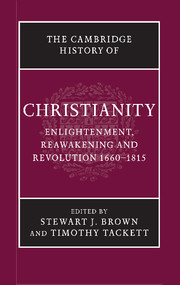Book contents
- Frontmatter
- Introduction
- PART I CHURCH, STATE, AND SOCIETY IN THE EUROPEAN WORLD, 1660–1780
- 1 Continental Catholic Europe
- 2 Continental Protestant Europe
- 3 Great Britain and Ireland
- 4 The church in economy and society
- PART II CHRISTIAN LIFE IN THE EUROPEAN WORLD, 1660–1780
- PART III MOVEMENTS AND CHALLENGES
- PART IV CHRISTIAN DEVELOPMENTS IN THE NON-EUROPEAN WORLD
- PART V REVOLUTION AND THE CHRISTIAN WORLD
- Chronology
- Bibliography
- Index
- References
4 - The church in economy and society
from PART I - CHURCH, STATE, AND SOCIETY IN THE EUROPEAN WORLD, 1660–1780
Published online by Cambridge University Press: 28 March 2008
- Frontmatter
- Introduction
- PART I CHURCH, STATE, AND SOCIETY IN THE EUROPEAN WORLD, 1660–1780
- 1 Continental Catholic Europe
- 2 Continental Protestant Europe
- 3 Great Britain and Ireland
- 4 The church in economy and society
- PART II CHRISTIAN LIFE IN THE EUROPEAN WORLD, 1660–1780
- PART III MOVEMENTS AND CHALLENGES
- PART IV CHRISTIAN DEVELOPMENTS IN THE NON-EUROPEAN WORLD
- PART V REVOLUTION AND THE CHRISTIAN WORLD
- Chronology
- Bibliography
- Index
- References
Summary
In early modern Europe, Christianity touched most people’s lives, from their baptism shortly after birth to the funeral services after death. Christianity affected even mundane details of daily existence. Tolling church bells marked the time of day, and at least in Catholic regions, saints’ feast days were used to designate when a market was held or a debt was due. The Sabbath and feast days dictated when Christians rested, and the vast majority of Europeans who toiled in the fields turned a significant portion of what they produced (often on the order of 7 per cent or so of the major crops) over to churches that had rights to the tithe.
Christian churches owned large amounts of property too, particularly in Catholic countries, and throughout Europe they ran or supervised charities, schools, and universities. They were also what we would today call major employers, for they provided both men and women with a religious calling. And of course they exhorted the faithful to lead Christian lives. Precisely what that meant might be different in Rome and Geneva, but it would certainly influence a believer’s dealings in early modern society.
Since Christianity extended its reach into nearly every corner of life, one can naturally ask what effect it had on economy and society, especially in a period (1660–1815) that witnessed not just the dislocations of the French Revolution but the beginnings of the Industrial Revolution in England. One can turn the question around too, and ask how the economy affected the Christian churches. These questions have long interested historians and social scientists – notably the sociologist Max Weber (1864–1920).
- Type
- Chapter
- Information
- The Cambridge History of Christianity , pp. 72 - 86Publisher: Cambridge University PressPrint publication year: 2006



